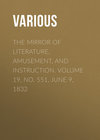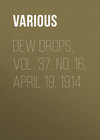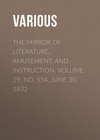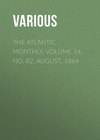Loe raamatut: «The Mirror of Literature, Amusement, and Instruction. Volume 14, No. 393, October 10, 1829», lehekülg 4
And, like Fitzjames, he cursed the hunt,
And sorely cursed the day,
And mus'd a new Gray's elegy
On his departed gray.
Huggins now betook him to the Wells—the Hunt was o'er—and many a joke is told—
How Huggins stood when he was rubb'd
By help and ostler kind,
And when they cleaned the clay before,
How "worse remain'd behind."
And one, how he had found a horse
Adrift—a goodly gray!
And kindly rode the nag, for fear
The nag should go astray.
Huggins claims the horse, and offers "a bottle and a pound" for his recovery:
The wine was drunk,—the money paid,
Tho' not without remorse.
To pay another man so much,
For riding on his horse.
MORAL.
Thus Pleasure oft eludes our grasp,
Just when we think to grip her;
And hunting after Happiness,
We only hunt a slipper.
The tale occupies less than thirty pages, and may be read whilst smoking a cigar. It is all quaint fun, whim, humour, and frolic, and one of those merry morsels which amuse us more than the whole leaven of utilitarianism; and if to laugh and learn be your maxim, why read the "Epping Hunt." After this, hold your sides, and look at the cuts, designed by George Cruikshank, and engraved by Branston, Bonner, Slader, and T. Williams. Old Tom Rounding is the frontispiece, in a cosy chair, and glass in hand—framed with foxes', and Towler and Jowler's heads, antlers, &c. The rich twinkle of Tom's eye, and the benevolent rotundity of his form, are admirable. Huggins hitched on a tree is the next—then comes "the beast charging in Tom's rear;" his perturbed look and the saucy waggery of a round headed wight who has climbed into an adjoining tree are a good contrast; Huggins "sitting on a thorn" is another ludicrous picture of perturbation; the cit on the grass, with "cattle grazed here" on a tree, is the fifth; and Huggins being cleared of clay by two of Tom Roundhead's helpers, with mop and broom, completes the cuts and catastrophes of the Epping Hunt.
The engravings, one and all, are exceedingly clever, and proof impressions, (which we observe are advertised,) will soon find their way into scores of scrapbooks.
The Sketch-Book
THE SPIRIT OF THE STORM
(For the Mirror.)
When the unfortunate Cedric (who had imbued his hands in the blood of another,) was endeavouring by flight to a distant land to evade the arm of justice, there existed a belief in a supernatural being, whose exclusive office was,
To guide the whirlwind and direct the storm.
It was imagined that he circumnavigated the globe in a chariot of fire that was wafted on the wings of the wind through the illimitable fields of aether, but that he ever kept within the bounds of our atmosphere. His course was preceded by thunder and lightning—and storm and tempest followed him wherever he went. He visited every climate in succession, and had a vast concourse of inferior spirits at his command. He never paused in his terrible career, but to witness the shipwreck of a felon, and then only was he visible to mortal view. He was The Spirit of the Storm!
The recollection of this personage occurred to the mind of Cedric, accompanied with no very pleasing associations, just as the Levantine cleared the mouth of the harbour, and was bearing a full sail before a propitious northern gale for India.
A quick voyage had almost brought the vessel successfully to the desired port, when an accident, fatal in its termination occurred, which we shall endeavour to relate.
There was on board an old man who had long been in the habit of reading the almanac, observing the changes of the wind and moon, the rising and setting of the sun, the degree of heat or cold, dryness or dampness of the atmosphere, the form and colour of the clouds, the rising and falling of the mercury, and several other similar indications of the weather, who for his knowledge in these matters, had obtained the epithet of "weatherwise," and indeed not without reason, for although he might sometimes be wrong in his prognostications to the no small amusement of others, and to his own mortification; yet in general they were pretty correct, especially of the approach of a storm in a tropical climate.
One fine evening whilst walking on the deck, he carelessly observed, that there would be a heavy sea gale, accompanied by rain, before morning. The captain of the vessel, who happened to be within hearing, cursed the poor fellow for his prediction, declaring that he kept the whole crew in a state of alarm, and vowing that if he foretold another tempest he would throw him overboard. The old man, who had a considerable opinion of his own talents, calmly replied, "experientia docet."
Cedric, from being one of the most daring and reckless spirits of his age, on hearing the above parley, and aware of their proximity to a rocky and dangerous shore, became terrified. The fear of a wreck overcame his once undaunted but now agitated frame, and a stiff glass of grog was found necessary to support him.
At midnight (having previously been sleeping soundly, composed by the soporific effects of the dram, lulled by the music of the rising breeze, and the gentle undulations of the reeling vessel) he was flung several yards from his hammock, and received a contusion on the head, which for some time deprived him of his senses. When he had somewhat recovered, the rocking of the vessel, the howling of the wind, and the creeking of the timbers, told him but too truly that the old man's prophecy was being fulfilled.
He went hastily on deck, half dressed and nearly frantic through fear, to ascertain his opinion of the probable extent of the danger to which they were exposed. But, alas! the old man, who had been placed at the helm as the only person capable of conducting the vessel in so perilous a situation, had been swept overboard by one of the early surges. He spoke to many, but none seemed disposed to listen to him; each person being too much engaged with his own concerns to attend to those of others.
Every hand seemed paralyzed; the vessel without a steersman at the helm—without a sailor to haul down a shroud, was cleaving the ocean at the mercy of the winds and the waves!
His sense of guilt at this moment was overpowering; hitherto (partly occasioned by ignorance, and partly by depraved habits of life) a degree of thoughtlessness had possessed him, which it is almost impossible to conceive could reign in the breast of a being endued with reason. Now indeed his eyes were open to his fate—to his earthly fate; a strange foreboding came upon him; it was a species of instinctive horror; he could not look beyond it. Whether there was a being who ruled the world, or whether there was not, had never been the subject of his meditations; yet a secret whisper intimated to him that death would not be the bound of his hopes and his fears—of his joys and his sorrows.
He was conscious of the blackness of his crime, which indeed was of the deepest dye, and that he had never till then experienced the arm of vengeance. He shuddered as the violence of the tempest increased.
He had braved the seas—he had fought with the enemies of his country; but never did fear paralyze the daring Cedric before. He fell senseless on the deck entangled in the shattered cordage, whereby he was preserved from being washed overboard by the mountain billows, which every moment engulfed the vessel, threatening immediate destruction to all on board.
The murkiest cloud that ever hid the skies from the view of man, now rode in universal blackness over the horror-stricken crew, which, opening every pore, as though at once to overwhelm creation, poured forth its contents like one vast sea descending to overflow another. The winds gathered from every quarter with unparalleled fury. Thunders rolled with that incessant clamour which pervades a field of earthly battle; but artillery, whose dreadful note hath made the hardiest and the boldest quake, utters with but feeble voice to that which that night growled on the craggy shores of India. And lightnings fell, as when Elijah called on heaven to answer him, and fire descended to proclaim the true Jehovah's name, and hail the one true prophet!
The Levantine now struck with tremendous force against a rock, which lay concealed amidst the swelling waters, and instantaneously disappeared, leaving the wretched crew floating on the surface—borne on the billows!
Cedric, by the tumultuous fury of the element, was thrown on a shelf of one of the steep rocks which form a natural barrier between the sea and land; being recovered from his stupor, he was again awake to the horrors that surrounded him; what had become of his comrades he knew not—he thought not. He clung to a fragment of the precipice with the desperation and firm grasp of madness—while every successive tide that rolled over his head became stronger and stronger.
He counted the billows as they passed over him; he watched the receding wave—he looked sternly at the approaching one. Time with him was fast ebbing. The wave that was to wash him into eternity was already curling towards him in fearful whiteness, which the glare of lightnings that seemed to illuminate the universe showed him in all its terrors.
At the same time he distinguished a towering rock which the darkness had hitherto obscured, but which now rose in awful majesty before him, amidst the spray and foam of the heaving surges, and seemed a sea-god's throne! The sublimity and magnificence of the storm were now at their height! On the summit of the conical rock, which was reddened by the fierce blaze of the brilliant fires that incessantly played around it, appeared a colossal figure, arrayed in white, whose long tresses and flowing robes streamed with the wind. The figure pointed at the hopeless Cedric with a deadly smile on his countenance. Cedric glared wildly at the unearthly vision. The last whelming wave approached and buried him for ever in the foaming sea.
The spectre mounted his car, attended by an innumerable host of tributary spirits, and was borne on the whirlwind to visit other climes. He was the Spirit of the Storm!
CYMBELINE.




















